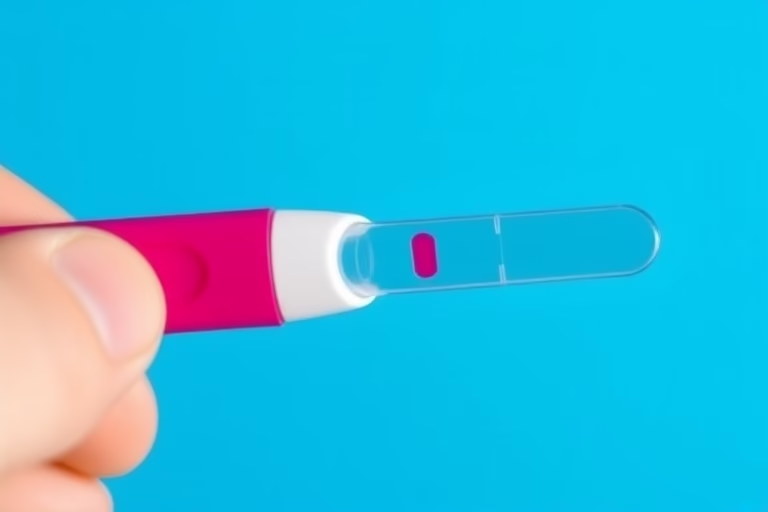Understanding Implantation Bleeding and Positive Test Results
In this article, we will be talking about implantation bleeding and how it relates to positive pregnancy test results. Implantation bleeding occurs when a fertilized egg attaches to the lining of the uterus, typically around 6 to 12 days after conception. This is a crucial point in the early stages of pregnancy, as it signifies the beginning of the process wherein the embryo begins to embed itself into the uterine wall. The light spotting that some women experience during this time can often be confused with a menstrual period, leading to potential misunderstandings about pregnancy status.
When a woman experiences implantation bleeding and then takes a pregnancy test, she may be hopeful for a positive result. A positive test indicates the presence of the hormone hCG (human Chorionic Gonadotropin) in the body, a key marker of pregnancy. Understanding the timing and symptoms of implantation bleeding can provide clarity and insight into whether a woman is pregnant or not.
Recognizing the Signs of Implantation Bleeding
One of the first steps is recognizing the signs of implantation bleeding. This bleeding often appears as light spotting and is different in various ways from a typical menstrual period.
The primary characteristics of implantation bleeding include:
Identifying these signs early on can help you make an informed decision regarding whether to take a pregnancy test.
Timing and Relationship of Symptoms to Test Results
Timing plays a vital role in understanding the relationship between implantation bleeding and a positive pregnancy test. The timing of the test can determine its accuracy. Generally, pregnancy tests are most reliable when taken after a missed period, which is about two weeks after ovulation.
After implantation bleeding occurs, the body will begin to produce hCG. An early test taken too soon may result in a negative result even if pregnancy has occurred. Therefore, waiting a few days after noticing light bleeding before taking a test can significantly improve the likelihood of getting an accurate positive result.
Several women report varying experiences regarding the timing of symptom onset and test results:
Understanding the timing is crucial for management of expectations regarding test outcomes.
Different Types of Pregnancy Tests
When testing for pregnancy, several types of tests are available, each with different levels of accuracy and timeliness. The common types include:
Home pregnancy tests are typically sensitive and can provide accurate results several days before a missed period, especially when used correctly. It is essential to follow the instructions for the best possible accuracy.
Interpreting Positive Test Results
A positive pregnancy test is an exciting moment for many, but it can sometimes raise questions about next steps. After receiving a positive result, it is advisable to:
Understanding these next steps can ease worries and help manage the overall experience of pregnancy.
Possible Complications Following Implantation Bleeding
While implantation bleeding is usually normal, some women may worry about potential complications. In some cases, bleeding can indicate underlying issues. Possible concerns include:
If any concerning symptoms arise, it is important to consult a medical professional quickly.
Myths and Misconceptions About Implantation Bleeding
There are several myths surrounding implantation bleeding that can mislead individuals. Recognizing and debunking these is essential for clarity:
Having knowledge about these myths can prevent misunderstandings and anxiety during this crucial time.
Final Thoughts
Recognizing implantation bleeding and understanding its correlation with positive pregnancy test results is vital for expecting mothers. Identifying the signs, timing, types of tests available, and how to interpret results can lead to more informed decisions. It is also essential to acknowledge the possible complications and mythbusting pertaining to this subject. Stress often surrounds the processes of pregnancy, and having the right information can alleviate concerns and enhance the experience.
If you experience signs of implantation bleeding, and if a positive test result follows, it is crucial to follow up with a healthcare professional to ensure a healthy start to your pregnancy. Staying informed and prepared can make a significant difference in navigating early pregnancy stages with confidence and care.
Frequently Asked Questions
1. What exactly is implantation bleeding?
Implantation bleeding is light spotting that can occur when a fertilized egg attaches to the uterine wall, typically occurring a few days before a missed period.
2. How long does implantation bleeding last?
This type of bleeding usually lasts from a few hours to a couple of days.
3. Can I still take a pregnancy test during implantation bleeding?
It is advisable to wait a few days after experiencing signs of implantation bleeding for the most accurate results on a pregnancy test.
4. What should I do if I notice heavy bleeding during early pregnancy?
If heavy bleeding occurs along with severe pain, it is important to seek medical attention immediately as it could indicate complications.
5. Are home pregnancy tests reliable?
Yes, home pregnancy tests can provide reliable results when used according to the instructions, especially after a missed period.
Further Reading
What Type of Psychotherapy Is Best for Anxiety?







